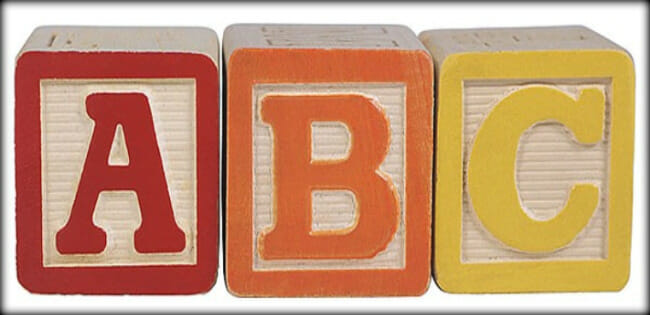How often do you talk to your children about finances…and I don’t mean casual statements like, “we can’t afford that”?
Statistics show that 75% of adults say it’s important to educate children about finances, but only 36% of them do so!
I know my parents did a great job of teaching and explaining the basic concepts of saving, spending, and investing at a very young age. I had a savings account by the time I was 6 and I was “managing” my money soon after! At times, their financial “advice” was annoying, but now I can’t thank them enough. I see so many people who were NEVER taught how to manage their money and are now paying for it with high-interest debt — and lots of stress.
Take a few moments this week to begin some type of money management discussion with your children.
Use these ABCD’s to get started!
Allowance:
It’s important for children of all ages to have some of their own money. The amount may depend on the child’s age or on the number of chore they do around your house. Take the time to inform your children what they can do to earn an allowance and then give them a few simple ideas on how to save/spend their allowance.
Try to let them make some of their own financial decisions first!
Beyond Saving:
It’s important to teach your children to save some {or most} their money. You’ll probably want to open some type of savings account for them as well; which you should be able to do for free.
However, there is more to life than just saving money and never using it, enjoying it, or giving it. Teach your children that it’s OK to spend their money as long as it’s a thought-out decision and not an impuls purchase.
Encourage them to pick a charity or cause to donate a portion of their money. Sponsoring children from another country might also be a fun way to see how their money can help others.
Calculate Costs:
Do your children know how much you spend on groceries, gas, utilities bills, etc? Probably not…and that’s OK.
However, it might be a fun project to put them “in charge” of their back-to-school shopping. Ask them to estimate how much their supplies might cost. Then help them shop (keeping track of prices) and see if they can stay under budget.
Often kids completely underestimate how much everything costs…this might be a fun and education learning experience for them.
Discipline:
Encourage your children to continually keep track of all their income, spending, saving, giving etc. This will help them to see the bigger picture, and hopefully become more disciplined with their finances.
Work with your children to set specific goals and then make plans to reach these goals. If your child wants to save up for a new toy or a video game, help them figure out how much they need to save each week and when they will have saved up enough money.
Practicing disciplined spending and delayed gratification NOW, will benefit your children later in life.
As your children get older, you will most likely want to tweak your system. Keep track of what works and what doesn’t work and make sure you praise them for any progress they make!
Here are a few resources to get you started:
- Teaching Money to Kids — website devoted to “growing money savvy kids”
- First Kid Bank — this is cool! It’s a virtual bank to help your children track their allowance, saving, spending, and more
- TheMint.org — Money smart advice, activities, and resources for kids, teens, parents, and teachers
- Parent Further — excellent parenting site that also offers lots of advice about kids and money
- Moonjar.com — offers kits and resources to teach children about “Saving, Spending, and Sharing”
What resources do you use with your children. I’d love to add them to my list!


MainlineMom says
Love this, I write about this frequently on my blog. I, too, was raised with very smart parents who educated me in financial matters well.
Here’s a site I found that’s great for teaching money to kiddos: http://www.moneybunny.com/
Andrea says
Thanks for the resource!